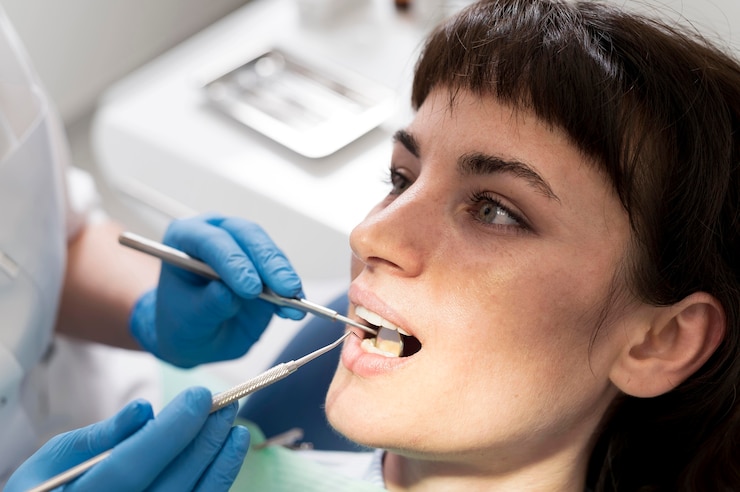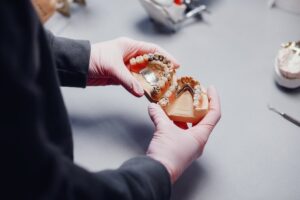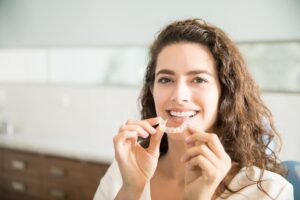Cosmetic tooth bonding is a flexible and non-invasive procedure recommended for restoring decayed, fractured, or chipped teeth. Composite resin, which comes in several shades, is frequently use to improve teeth’s aesthetic appearance. It is a tooth-color material permanently bond to the tooth using a dental curing light.
Tooth bonding is an excellent alternative for people seeking inexpensive treatment options to repair and mask tooth defects, such as tooth discoloration. It is a popular treatment choice among cosmetic dentist.
Signs that You Require Tooth Bonding
The following are some signs that you could benefit from tooth bonding:
- Gaps in Teeth: Minor gaps in teeth can be covered using tooth bonding. This is a quick process that can be complete in a single sitting. If gaps are significant, you might require orthodontic treatment to correct the dental issue.
- Chipped, Disfigured, or Fractured tooth: Tooth bonding is also beneficial in cases with chipped or fractured tooth parts. The composite resin can be molded, and the shape of the broken tooth can be restored. However, if the fractured part of the tooth is extensive, then composite bonded teeth are not as durable. Crowns are a more suitable choice in severely damaged cases.
- Discoloration of Teeth: When the discoloration of teeth cannot be corrected using teeth whitening procedures, dentists recommend masking the discolored surface. The two ideal choices are tooth bonding and veneers. However, costs for both treatments vary. Dental veneers can cost up to $2000 or more per tooth, 3 times more than tooth bonding cost. Both treatments provide the same results; hence, tooth bonding can be a good budget-friendly option.
- Dental Decay: Dentist bonding teeth in patients with small cavities is very common. Composite resin has high strength and is frequently use to restore natural tooth structure. After cleaning out the decay part, the composite can be directly bond onto the tooth. The shade is match before the treatment to blend seamlessly with the natural tooth structure.
- Worn-out or Exposed Teeth Because of Gum Recession: Tooth bonding is ideal for restoring attrited and worn-out teeth. It helps reduce sensitivity by covering the exposed dentin and prevents further wear and tear, preserving the natural tooth structure.

Dental Bonding Care and Longevity
Dental bonding is permanently bond to the tooth using bonding agents. However, it is not the most durable restoration option, and even with good care and hygiene maintenance, it can last up to 5-6 years at maximum.
It is common for composite material to detach from the tooth or break due to heavy occlusal forces. Additionally, over time, the color of the composite may change because of dietary habits or other detrimental oral practices.
To prevent staining, it is advisable to avoid coffee, carbonated drinks with added color, smoking, and tobacco chewing, as these can discolor both teeth and composite bonding. To extend the lifespan of the filling, avoid biting directly on hard objects, especially in the front tooth region.

When is Dental Bonding not the Right Option
Dental bonding doesn’t require repeated trips to the dentist and is a quick and painless treatment. However, it is not a suitable option in all cases.
- The defect is too large: When cavities are large, and most of the natural tooth structure is lost, the tooth cannot survive with dental bonding alone. In such cases, additional support is need for the tooth to function normally, and crown placement becomes necessary. Composite resin cannot withstand heavy occlusal forces and is prone to fracture without support.
- Malaligned teeth with deep bite or crossbite: Malaligned teeth do not distribute occlusal forces evenly, leading to the breakage or fracture of the composite. Dental bonding is successful only when the teeth are properly align in normal positions following orthodontic treatment.
Conclusion
Tooth bonding is a fast, affordable solution for achieving instant results and enhancing your smile. To discuss your expectations and decide if tooth bonding is the best course of action for you, it is imperative that you schedule a consultation with your dentist. Your dentist will conduct an examination and provide recommendations tailored to your needs.
At Valley Ridge Dental, our skilled cosmetic dentists specialize in transforming smiles. Whether you’re looking to correct minor imperfections or achieve a dazzling, confident look, we’re here to help. With our compassionate approach, we aim to turn your smile insecurities into your favorite feature.
Schedule an appointment with us today! Call us at (651) 439-0322 or visit our website at valleyridgedental.com. Let us help you achieve the smile you’ve always dreamed of!





